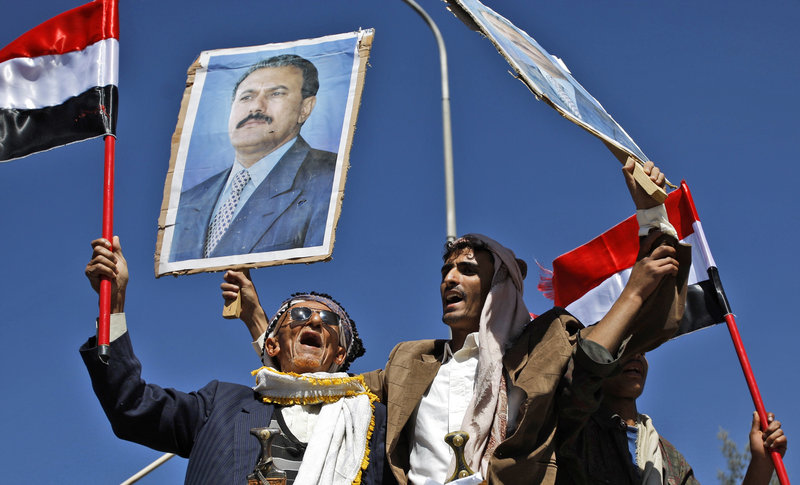SAN’A, Yemen — The continuing wave of unrest sweeping the Middle East led to a fifth day of protests Tuesday in Yemen while thousands of protesters swept into the main square of the capital of Bahrain, setting up tents and vowing to stay until the government agrees to major reforms.
In Iran, hardliners in parliament demanded that opposition leaders be executed for advocating protests that attracted tens of thousands of people.
As many as a thousand anti-government protesters marched through the streets of the Yemeni capital of Sanaa, but it was large numbers of supporters of President Ali Abdullah Saleh who appeared to have the upper hand, gathering in a downtown festival with music and nationalist slogans.
Young men in tribal dress milled around the entrances to the square bearing sharpened sticks and bludgeons, and pictures of the president, who has ruled Yemen for more than 30 years, suddenly proliferated on cars and buildings around the capital.
Yet despite a day of fewer clashes than before, Yemeni protesters vowed to press their street revolt until Saleh steps down.
“Years of trying to keep the Yemeni people in ignorance and poverty have failed,” said protester Jameel Awad, a 28-year-old taxi driver. “Tunisia and Egypt have shown us that nothing is impossible. The youth see that this is their time to claim the future … and we will not let the opportunity pass.”
In Bahrain, the death of a second protester, killed when police clashed with mourners at a funeral assembly for a demonstrator shot Friday, prompted more than 6,000 people to march into Pearl Square in the capital of Manama. Many declared their intention to remain until the government addresses longstanding grievances over political discrimination and police repression.
Protesters have said their chief demand is the resignation of the prime minister, Khalifa bin Salman al-Khalifa, the king’s uncle and one of the wealthiest men in the country, who has held the post since Bahrain’s independence from British control in 1971.
By Tuesday night, protesters were setting up tents and sleeping bags and passing out food, water and tea in an echo of the 18-day occupation of Cairo’s Tahrir Square that led to the resignation of Egyptian President Hosni Mubarak on Friday.
“All the people now are protesting inside the roundabout, and they declared that they will not move from this roundabout if they don’t get their demands,” said Mohammed al-Maskati, head of the Bahrain Youth Society for Human Rights. “So now, people are going to their houses to get what they need to stay, and they will sleep in the roundabout.”
King Hamad bin Isa al-Khalifa in a televised speech said the deaths of the two protesters would be investigated.
Two young men also died in Iran in demonstrations on Monday, when tens of thousands of marchers demanding an end to repression and calling for free elections were set upon by citizen militias known as Basijis and police wielding tear gas and rubber bullets.
Some members of parliament called for the executions of opposition leaders Mir Hossein Mousavi and Mahdi Karroubi.
“The chiefs of the sedition have reached the end of the road and it is time for (the authorities) to do their duty and judge and punish them,” Ayatollah Ahmad Khatami said in a statement carried by the Fars news agency.
Send questions/comments to the editors.



Success. Please wait for the page to reload. If the page does not reload within 5 seconds, please refresh the page.
Enter your email and password to access comments.
Hi, to comment on stories you must . This profile is in addition to your subscription and website login.
Already have a commenting profile? .
Invalid username/password.
Please check your email to confirm and complete your registration.
Only subscribers are eligible to post comments. Please subscribe or login first for digital access. Here’s why.
Use the form below to reset your password. When you've submitted your account email, we will send an email with a reset code.